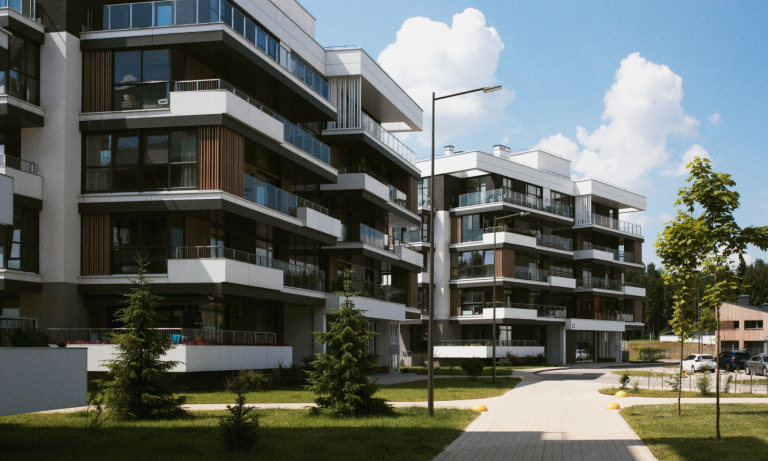Not everyone wants to, or can afford, to buy and live in a standalone house. Some people prefer the safety and community that sectional title living offers.
Simply put, sectional title means that you buy – and own – a section of a larger building, block or complex of houses. A good example is a block of apartments. This block has ten units, let’s say. You love unit 2. You want to buy unit 2. What this means is that you’d own the whole inside of unit 2, and anything that is attached to that unit, like a balcony or garden, parking bay or garage or storeroom.
All the other spaces in and around the block are considered “common property”, meaning that all residents of the block have access to them. These could include a communal garden, swimming pool, clubhouse and washing line area.
In many cities in South Africa, sectional title living is very popular and provides a lot of benefits, like security, shared resources and convenience. But there are some things to keep in mind before signing on the dotted line. Read on and make sure you’ve thought about whether sectional title living is for you.
Most sectional title properties include a levy, a monthly fee payable to the body corporate (an elected group of owners who manage the day-to-day running of the property). Often, it’s much cheaper to pool resources to maintain a building and do renovations, repairs and upgrades to the common areas like the boundary walls, gates and the building facade.
The flip side is that you don’t always get a say in how the levies are spent. And you may not always agree with the consensus. Then there is also the consideration of special levies. These are imposed when the body corporate needs to spend money over and above for urgent repairs and maintenance. Again, it’s majority rules so if you’re not happy with a collective making financial decisions about the place you live in, think twice about sectional title.

Because there are a lot of people using and sharing common areas, amenities and resources, and because a shared living environment needs to maintain a consistent appearance, it means that there are specific rules and regulations that apply to everyone.
Perhaps your house needs to be painted a certain colour. Or you can’t hang laundry on your balcony. A no-pets policy is often a deal-breaker. Renovations and alterations are strictly governed as they can often be noisy and disruptive to neighbours.
It’s important to ask your agent for a copy of the conduct and rules before you buy. Often these rules make life easier and simpler for everyone, but it’s best to understand if you can and want to be subject to them.
The body corporate is usually responsible for installing and maintaining security for the whole block or complex. These would include things like electric fencing, armed response and security cameras. Having to install these at a standalone house would be very expensive. Also, some people feel safer knowing that other people are close by should anything happen.
There is a saying that good fences make good neighbours. But fences aren’t always possible or allowed in sectional title properties. The reality is you’ll be living more closely to and sharing common spaces with people you don’t know and may not even like.
Not everyone wants to live in close proximity to their neighbours. Others enjoy the sense of community. Most complaints in sectional title properties relate to neighbour disputes: noise complaints, parking issues, use (or abuse) of shared amenities and disagreements on how the levies should be spent. And if your complaint goes unheard by the body corporate, that may not sit well.
Whether it’s affordability, convenience, location, security or other considerations, sectional title living is a popular option for many buyers, especially first-time owners. Know what you want, what your options are and make a decision based on what will make your home and surrounding space a happy one for you and your family.






















































































